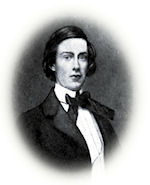Headquarters 2d Brigade, S. C.
Beaufort, S. C. March 24th, 1862.
My dear Mother:
The steamer arrived last night, bringing a long letter from you, one from Horace and one from Walter, affording of course much pleasure, but the tone of all occasioning much surprise. Indeed, in the midst of all our victories and astonishing successes, it is to me inexplicable why McClellan should be attacked with such a savage spirit! I had no idea that the spirit of malevolence could carry men so far, but I am confident that McClellan will stand justified on the pages of history for preferring to ensure victory where reverses would have been well nigh fatal. The plan of the present grand campaign may not entirely have originated with McClellan, but undoubtedly he had the total arrangement of it. It seems to me to be as wise and perfect a one as was possible, considering the magnificence of its proportions. Of course, people will cry: “Why was not all that has been done, done long ago?” But I honor him the more that he had the moral courage to wait. It is well enough to talk about the immense army at his disposal, but if the army is a mere mob without cohesive power, a Napoleon might lead them, and see them fly from earthworks that would excite a soldier’s derision. I believe now we have an army of soldiers, and believe we will win victories at every turn. I do not forget though the lesson of Bull Run, and more than that, it is not many months ago I can remember that our army, despite every effort of its commanders, was a poor, cowed, spiritless thing — a good army to get killed in, but a poor one to look for the crown of laurel. I say McClellan has done a glorious thing, and shame on his detractors! A few short weeks ago when Elliott was off recruiting, he met with few recruits, but many a coward tongue eloquently detailing our reverses. And now I suppose they would rob those who have borne the burden and heat of day, of the poor praise which they had hoped for when the fruit of their labors had ripened, and the reapers were ready to gather a harvest of glory. I have heard many say that they do not pretend to have any military knowledge, but they do pretend to be governed by a little common sense, and common sense teaches them so-and-so. Now, dear mother, be sure, when you hear men talk thus, that common sense means simply pure ignorance. It was this common sense, alias ignorance, that forced the battle of Bull Run. It was a little military knowledge that has made the opening of the year 1862 a glorious one for our Union Army. Enough! I have had my say — have expressed my disgust — and may now change the subject.
My dearest Mother, it will be a sweet thing for us all to see peace once more restored, and I do not doubt that no one prays more earnestly for it than yourself. I cannot but feel that a Higher Power has guided us of late to victory and do not fear for the result, yet bloody battles must be fought in which we must all partake, before the olive-branch is possible. I hardly think that the impatient ones at home, who are clamorous as to the inactivity and want of efficiency of our army, will have in the end any reason to complain that blood enough has not been shed to compensate them for the millions they have expended on it.
Many think that before July the war will be ended. How pleasant a time it will be when I can honorably return home. There is no sweeter anticipation than the joy I know my return would bring to your heart. I have been called away to attend to some business. Very much love to my dear sisters and the little ones.
Affec’y.,
I wrote the above shortly after reading my letters. Since then I have been diligently reading the papers, and perhaps must modify my opinions somewhat, but as the mail leaves in a few moments, you must take the first outburst, or none. You offer me a flag; send it, dear mother, by all means. It shall be carried when we advance.
Lovingly,
Will.



